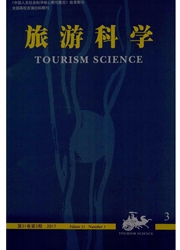

 中文摘要:
中文摘要:
营业税改增值税是我国实施结构性减税政策的重要改革方向。上海已经开始试点,试点范围将由上海市分批扩大至北京、天津、江苏、浙江、安徽、福建、湖北、广东、厦门和深圳10个省、直辖市、计划单列市,并将选择部分行业在全国范围试点。未来,营业税改增值税很可能向旅游服务业推广。在上述背景下,需要研究下列前沿性理论问题:我国旅游服务业营业税改增值税的影响机理是什么?我国旅游服务业营业税改增值税的影响状况是什么?本文运用不同税收特点及影响分析理论,探讨了我国旅游服务业营业税改增值税的影响机理,并通过对上海典型旅游企业的调查研究,分析了我国旅游服务业营业税改增值税的影响特点与影响状况。针对我国旅游服务业营业税改增值税的影响特点与状况,提出了我国旅游服务业营业税改增值税税率与存量固定资产进项税抵扣等的建议。
 英文摘要:
英文摘要:
Value added tax replacing business tax is an important reform direction of China' s structure-reducing tax. The reform trial initiates in Shanghai and will extends to 10 provinces and municipal cities including Beijing, Tianjin, Jiangsu, Zhejiang, Anhui, Fujian, Hubei, Guangdong, Xiamen and Shenzhen and the trial of some selected industries will be carried out all over China. The author beheves that this replacement will very likely extend to tourism service industry in the future. With this in mind the paper explores the mechanism and impacts of the reform on China' s tourism service industry based on the explanation of study background, purpose, methodology, contents and summary of main policies, constructs a theoretical framework for analyzing impact on the tourism service industry, discusses the impacts & policies of the reform on Shanghai' s hotels, travel agencies and scenery resorts with an investigation of typical samples of tourism enterprises in Shanghai, the thesis, to provide suggestions with the analysis of the characteristics of China' s tourism service industry. The findings of the thesis offer theoretical guidelines for the reform of value added tax replacing business tax to both Shanghai tourism and whole China.
 同期刊论文项目
同期刊论文项目
 同项目期刊论文
同项目期刊论文
 期刊信息
期刊信息
